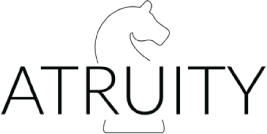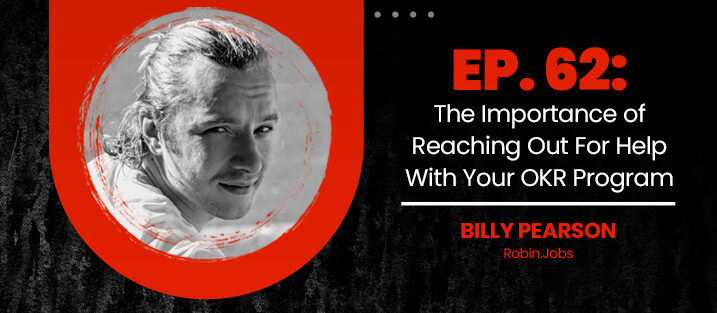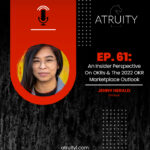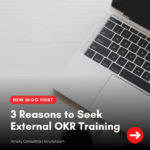OKRs Q&A Podcast Ep. 62: The Importance of Reaching Out for Help with Your OKR Program | Billy Pearson, Robin.jobs
In this episode of the OKRs Q&A Podcast, Tim Meinhardt interviews Billy Pearson, Marketing Manager and OKR Program Manager at Robin.jobs. This is an excellent case study in understanding the value of an OKR Consultant within any size organization.
Billy and Tim discuss the ins and outs of Robin.jobs’ OKR program, how Tim was able to help Billy and their organization resolve some of their largest OKR challenges, and how Tim reinvigorated their OKR program through OKR training with Atruity.
Tim and Billy met when Billy responded to a special ongoing offer that Atruity provides to all subscribers of their newsletter. If you are interested in signing up for our newsletter, send an email to contact@atruity1.com. All new newsletter subscribers get a copy of our E-Book The Seven C’s to OKR Success as well!
If you are interested in working with the Atruity team or have a question you would like addressed on the show, please email contact@atruity1.com or visit our website at www.atruity1.com
Tim Meinhardt:
Welcome everyone to another exciting episode of the OKRs Q&A Podcast, also known as the OKR Corral, where OKR insight is the king. I’m your host, Tim Meinhardt, President and CEO of Atruity, an OKR consultancy headquartered in our nation’s capital.
Before we begin, if you’re an OKR fan and enjoy our podcast, please subscribe, leave a review, and explore our website at www.atruity1.com. And finally, should you have a burning question you’d like addressed in future episodes, please drop us a note at contact@atruity1.com.
In this exciting episode, I have the pleasure of speaking with Billy Pearson, who is the Marketing Manager and OKR Program Manager at Robin.jobs. Billy responded to a special, ongoing offer that we provide to all our subscribers of our newsletter, which is a free hour of consulting with me or any member of our consulting team. If you are interested, by the way, in signing up for our newsletter, just send us an email to contact@atruity1.com. By the way, this is listed in the show notes as well, and our team will get you signed up. We also offer any of our new newsletter subscribers a copy of our e-book The Seven C’s to OKR Success. In my conversation with Billy, we had the opportunity to discuss the ins and outs of the Robin.jobs OKR program. I was so impressed with Billy as he started their OKR program without any prior OKR experience, and he did a fabulous job in launching their OKR journey. However, he had several key questions that he needed some answers on and chose to reach out to us and have a discussion and get our thoughts on his challenges.
They were not unusual, and sometimes even the simplest answer to a big question produces astounding results in an OKR program. What we also discovered in our conversation was that a small, targeted training seminar would go a long way towards helping the entire organization better understand OKRs, the OKR journey, and their application to everyone within the organization. This is a great podcast and an excellent case study for those who believe they can improve their OKR program, and it details how we were able to produce great results for Billy and the entire Robin.jobs organization, all because Billy reached out for help and booked a meeting with me. Their organization is now super excited and poised to have a fantastic year, and we could not be happier. So, everyone, please grab that cup of coffee, put in those earbuds, and enjoy my terrific conversation with Billy Pearson.
So, Billy, welcome to the program. Tell our audience a little bit about yourself, your background, and who you’re currently working with.
Billy Pearson:
So, my name is Billy. I’m Dutch and I live in Barcelona currently. And I’ve always been an online marketeer specializing in Google Marketing. So, like, Ezio, and advertising. And about a year ago, the current company I work for, Robin, the recruitment company, we were forced to go online and move our whole business online, two years ago already. And after that, like a year ago, we discovered something called OKRs that we found a very interesting. We needed something to align our company a little bit also, like in the online environment, to have everybody working on the same page. And that’s kind of how I rolled into OKRs. And it’s been a very interesting journey to help Robin, our company, to implement this and to start working with it and the results so far have been very, very good.
Tim Meinhardt:
Wonderful. Well, glad to hear that. You know, it’s funny; when you and I talked initially, it was through our newsletter that I said, and we have on there, you know, call us for a free hour of consultation.
Billy Pearson:
It was for Thanksgiving. I think it was a Thanksgiving email. Yeah, yeah.
Tim Meinhardt:
Right, yeah. And I didn’t even realize at the time, but you told me that you had listened to our Seven Cs webinar by GTMhub, and you actually had asked the question at the end. I thought that was really terrific.
Billy Pearson:
Yeah.
Tim Meinhardt:
That’s really good. And you know, OKRs are global. So, I think that it’s outstanding that you would take the initiative just to reach out. We had a great conversation, and you know, tell us about your OKR program before we spoke. I mean, if you reflect back on the experience, what do you think you did right in your initial implementation of OKRs and what was your first year OKR journey really like with Robin.
Billy Pearson:
Well, I mean, I had…when we started, I had zero idea of what OKRs were like. I was completely new to it. So, I just dived into Google basically. And at the time, we didn’t have a lot of resources to really like hire a professional to get like courses and that kind of stuff. So, and it’s kind of my style to just get my information myself and just get as much as possible. And that’s also how I ended up participating in your workshop at the time because I was applying everywhere, like I was getting all the information I wanted to that I can get my hands on that was for free or cheap. I dived in, so I registered for the Seven Cs workshop, which was very interesting and helped a lot, actually, to get a lot of inspiration for me to communicate that information back to my teammates because I was kind of like the leading person within the team to get as much information as possible and then sharing that with everybody that I was working with, and to kind of get them on board on working with OKRs too.
The journey in general in the last year has been kind of like that; just me gathering information, getting new pieces of information that worked with OKRs and just being consistent with it; I think was the most important takeaway for me this year is if you really want to implement it fully, you just need to have consistency and take it one step at a time and keep communicating well with your teammates so everybody’s like up to date on what they’re doing and how it all works. But it’s been a journey for sure. That’s one thing I can say because we didn’t really have people from, or like external parties helping us. So, it was just me gathering information from the internet and sharing it with our team. And you know, at some point, though, when I saw your email for the Thanksgiving Consult, I was like, “OK, now it’s time to like, really check in with somebody external to be like, ‘Hey, how are we doing?’” Because at that point, like it was just us and the information we have from the internet. And we really didn’t really have a point of reference on like how we were actually doing. So, when I saw your email, I was like, “This, all right, this is the time. Let’s check in with somebody who actually knows what it’s all about and see how we’re actually doing.” And I was so delighted to hear that you were so excited when I explained what we were doing. I was like, “This is amazing. We’re doing so well.” And I think that also really helped the team afterwards to confirm that with them, like they were kind of struggling with this feeling like, “Are we doing OK?” And so, after we had that workshop with you, Tim, then everybody was very excited and we all felt very confident in what we were doing. And I think that’s also a very important part in OKR implementation is to verify with outside sources are we actually doing ok?
Tim Meinhardt:
Yeah, yeah. I couldn’t agree with you more. You know, you mentioned a couple of the Cs—consistency and communication, which really are cornerstones for a well-run, OKR program. You know, I want to be specific here for a second, when we originally spoke, you had some really specific questions regarding the OKR program and what you thought either was—I’m not going to say it was missing—but it was the question around folks that didn’t know how to actually, from a support perspective, how they would set their OKRs. And so, can you elaborate for our audience a little bit on what you thought was missing maybe in your OKR program and what was happening as a result of not having these particular pieces?
Billy Pearson:
Well, I think the key takeaway, as most of us from this year, that I had a lot to learn and I’m still learning. But yeah, one of the things that we really struggled with for me with, like leading the OKR implementation, is that I had some team members like from a more supportive kind of department that were also very junior at their function, like we are quick growing company or just kind of like promoting internally people to take new positions and give them opportunities to learn a different feel than to, you know, to expand their knowledge. But it also means that there’s sometimes some inexperience and that brings, kind of like I was mentioning earlier, you need to have confidence, right? If you want to do your job properly, you need to be confident in what you’re doing. And when people are still learning their skills, it’s, you know, it can be hard sometimes to be confident in what you’re doing.
So, and that was kind of conflicting with the OKRs, as there were they were not really sure if the knowledge they had was good enough or for setting their OKRs, so they had trouble setting their OKRs because they didn’t really know enough about their fields in general, or at least that’s what they felt like. And they’re doing a great job, don’t get me wrong, but this uncertainty kind of struggled a little bit, and what helped, mostly with the workshop we did with you was that we established that OKRs are more about doing it and not necessarily like knowing all about it. And like, if your goal is, I’d be using this example lately, like if your goal is to read the Harry Potter trilogy or the Harry Potter books, but at this point, you don’t know how to read. Right? So, your first your first objectives would be to start a reading course. And that’s kind of where we’re aligning that with them, too. It’s like, you know, then what do you do? Where do you need to develop yourself as well and those OKRs and that kind of comforted them in some way to be more confident in setting their OKRs and in the things they really need to do, like the whole focus area is because you shifted a little bit from like, “Am I doing it? OK, am I doing OK?” But we shifted that to like, “Hey, so what do we do now to get there at some point?”
Tim Meinhardt:
Yeah. You know, that confidence area never gets talked about a lot, and it’s a very interesting piece, is it not?
Billy Pearson:
Yeah, I’m just thinking now, is it in one of the Seven Cs?
Tim Meinhardt:
Well, I think that it’s not, but it could be, an Eighth C. You know, I should write another book that says Another Seven Cs because there are so many things that go into an OKR program.
Billy Pearson:
Well, just call them The Cs.
Tim Meinhardt:
The Cs, right? So, and you know, confidence is a big deal. And I think, you know, I was going to ask you, and I do want to ask you about the takeaways that your organization had. We had a wonderful training session with your organization and I’ll call it training, yes, but it also was like a refresher course, kind of an ability to have an open discussion about OKRs for people that were kind of a little bit new to this, weren’t exactly sure what foot to put forward, h ow does it impact me, and so Billy, tell our audience a little bit about what you thought were the biggest key takeaways and benefits that that you had from meeting with us and getting this to our training with the with the Atruity team?
Billy Pearson:
Well, I think I mentioned two of them was like the confidence we gave some of the members. And the second part was also the inspiring part, which I kind of missed in general when I started doing OKRs. Like, it seems very simple. You know, it’s like you write an Objective and you write your Key Results and off you go. But the impact that OKRs really have on a company is way bigger, like it will change your company culture, you know, if you do it, if it’s implemented correctly. So also, with that inspiration part, mostly the stories they were told of bigger companies and how they’ve set there OKRs to be really inspiring and to really change the world, and then seeing that these people can do it and then with the same tools is kind of inspiring and that kind of helps create that motivation to start working with them as well. And we kind of got lost in that throughout the year or both. I never really got that part until lately. Like where that was important to us to have something inspiring at the top to really, you know, run down these OKR throughout the company.
Tim Meinhardt:
Before we continue with the interview. We’d like to tell you a little bit about Atruity.
Voiceover:
At Atruity we understand the challenge of implementing a successful OKR program. While the methodology may be straightforward and easy to understand, the implementation and execution of the program can seem daunting. Your team is concerned because you’re unsure how to properly implement or manage your OKR program. You are not alone. This is where Atruity comes in. We know how to implement an OKR program and are experts in OKR implementation and management. By using our proven methods and implementation structure, we can help you to successfully implement OKRs within your organization in as little as 30 days. If your organization is considering implementing OKRs or struggling with the management of the program, do not hesitate to reach out to us at contact@atruity1.com. Remember, no plan succeeds on its own—execution is everything.
Tim Meinhardt:
Billy, that’s a wonderful point because, you know, sometimes in running an OKR program, everybody gets focused on just running the program. But part of that running of it is to keep people excited. You know, we talk about a good Key Result that kind of frightens you a little bit, but excites you a lot, and bringing that passion and excitement as a champion, which you do a wonderful job at, that I think goes unnoticed sometimes when it looks at how you run a successful OKR program, it’s that keeping people inspired, keeping them excited. And I think we reignited that a little bit with your organization. And for some of the new folks that were a little bit timid, we gave them that area or that room a little bit, to feel confident enough that it’s OK to walk out a little bit. You don’t have to get it all right. You don’t have to be perfect. Let’s not let perfect get in the way of good to get started. And this is their OKR journey, as well as everyone’s OKR, and the key word is journey. You get better with it as you go, and giving them that confidence and inspiration to just take it, just jump off the bridge, you know, jump off the air.
Billy Pearson:
Yeah, and it’s OK to make mistakes.
Tim Meinhardt:
Yeah, absolutely. Absolutely. So, I’m dying. We have not really talked much since I did the training, and I just wondered kind of what’s the sensation or the feeling that’s going on right now with your team as we’re moving into the new year?
Billy Pearson:
A lot has been happening actually. I was struggling to kind of get my management team members basically on board of like gaining the confidence of like, you know, as much as me or even more, maybe, especially in your field right now. And I think I’ve been, like with that meeting we had with you, and after that, we had some talks too. And I was like, it’s up to you not to…like it shouldn’t be all dependent on me. Like, you have the skills and the knowledge to also start training your team on OKRs. Like, it’s OK. I mean, I can do it for everybody, but it will not feel as connected as if you get that training from your team leader, because then you can dive into the content straight and set your OKRs and your targets for the quarter, like as a team, you know, altogether, without having this external person kind of filling in between. And so that’s what we’ve done in the last few weeks. I’ve been getting feedback from the managers being like, “Hey, we’ve had this meeting with our team about setting our OKRs and it was great. All the workers they came with, with great ideas and they were like, and they kind of took the meeting, it just ran itself, basically. We came up with all these things that were holding us back or we really want to progress in, and we sorted all those problems out and we made three categories, and for each category, we set one Key Result for this quarter,” and I was like, “Oh my God, this is amazing.” I was like, “That’s fantastic.” That was like the best news I could have received, and I can really feel it taking off, and people are getting more confident in transferring the knowledge deeper down because it’s OK to have an OKR champion with their company. But it shouldn’t be all dependent on one person because that’s just impossible, especially if you have a big company.
Tim Meinhardt:
Absolutely. You know that evangelizing of the program and getting people involved and having their team involved like that. I just, you know, gives me a great feeling that, “Hey, they got it.” You know, we spent a couple hours going through some frameworks and your team is really getting it, and I’m just I’m so happy to hear that.
Billy Pearson:
Yeah, it’s fantastic.
Tim Meinhardt:
Yeah, that’s really, really cool. I love it, and they’re going to have a great year, and they’re going to have a great year with OKRs too, I’m convinced. So, you know, when we got started, Billy, it was really, you know, when I said, “OK, fine, let’s do this training,” you said, “Tim, what a great idea. Let me go back and try to get this agreed upon. What do you think was the biggest apprehension that everyone had with working with us? And how did we overcome that apprehension for you?
Billy Pearson:
Well, where I really sold it on basically, because I had some struggles selling it to the team—they were not convinced, but because I already had the meeting with you, that was my get in, like I already talked with this guy and I explained how good we’re doing and that helped me personally, really, like boost my confidence in the whole OKR program, and I want you to have that same feeling because I can’t give you that feeling because I’m not a verifiable source, if you will, to verify if we’re actually doing good because I’ve been in the same journey as you have.
So, like especially with the CEO of the company, I was like, “We need to do this.” And he actually chipped in a little bit to get the prize, though. He was like, “Billy, if you say this is what we really need, then then we’re going to do it.” And some other people still had some questions. But afterwards, like all the reactions were very positive and everybody was like, “I’m so glad we did that.” But it was mostly like getting, like we need to have some kind of outside source or some third party like verifying that we are actually doing really good or bad in some cases. Like we need to at least get some sign of outside person to come in and tell us how we’re doing. Because if we just keep it within us, then we don’t really have a way of verifying that.
Tim Meinhardt:
Right, you know, validating some of the work that you did, I think, was a was a big boost for you as someone that’s running the program and, you know, and then being able to let them know that this is a journey, and that we’re not going to get it all right at first. And sometimes it’s best to…just let’s get a sanity check. Let’s do a team training to make sure we all understand the concepts the right way. And I think that your team…and by the way, I had a blast with your team training. It was so much fun because we went over what questions do you have specifically? And we addressed those questions throughout our training, which I thought brought some context to them because sometimes you don’t, you don’t really know, and I’ll talk about it as staying in the swim lanes, but we want to know what people’s apprehensions are. There are challenges to any type of management program that you put in, Billy. And so, what I wanted to do, and you and I talked about it, I said, “Look, I’m going to ask each person, what is their thoughts? What are their concerns? What are their challenges? What are they thinking? What do they most want to get out of this training?” And I think we kind of nailed it at the end, you know, and like I said, I had a blast with your people. They were very receptive to it, which I thought was terrific. So, what would you say to someone who is interested in working with us or speaking to us, really, about training or becoming a client?
Billy Pearson:
I mean, from the works, you have the experience again, like you can tell. You immediately have great examples from previous situations you’ve been in where you can really connect with each person. And that’s what I loved about the workshop too, is where you really took time for each person individually like, so what’s holding you back? What’s your question? I mean, it’s good to give a presentation, but to really, like, go run down each person separately to be like, “What is your problem? And how can I answer your question?” That helps, amazingly a lot, because then not just for the person individually, but for the rest of the team to hear all those questions, like going around and seeing your view on that was really helpful. Yeah, yeah.
Tim Meinhardt:
That’s terrific.
Billy Pearson:
Does that answer your question?
Tim Meinhardt:
No, it absolutely does. Terrific. OK, so Billy, I’m going to close with saying that, you know, I’ve enjoyed having you. Again, I want to say how delightful it was to have you reach out to me via our newsletter because we send it out to a lot of people. And you can tell sometimes people get hesitant about reaching out, and you did. You took it upon yourself to do so. And I thought that was fantastic.
Billy Pearson:
Yeah, no, and I’m very glad I did like that. We’ve made so much progress just because of that Thanksgiving e-mail, basically. Well, also because of the workshop that you give. And that was that’s how I signed up for your newsletter at some point. And yeah, at the right time, at the right moment, I saw your email. I was like, “OK, this is my time to shine.”
Tim Meinhardt:
I love it. It’s great. So, all right, so I’m going to leave with the last question, which is, is there any insight that you would like to let our audience know about your journey and where you are today and heading into 2022 that they might love to hear that you’ve had a chance to develop over the last 12 to 14 months?
Billy Pearson:
Mostly, it’s OKRs are more complex than you would think, initially. I kind of, well, not make the mistake, but at first I really underestimated the impact OKRs have on the company. It kind of looks as a tool you can use and it’s kind of there on the side of the company. But if you really get behind the philosophy and the whole, you know, the whole mindset behind OKRs, it’s such a big impact for a company. And what I forgot to mention, too, is like not just having the validation from you, Tim, with the OKRs, but also the results of the company have been there. In the last three months we have been breaking records month after month, and we’re kind of like, “Oh, this is this is exciting. How did this happen?” And I’m kind of like in a meeting like, well, maybe OKRs”.
Tim Meinhardt:
It’s just a small part, just a small part.
Billy Pearson:
You don’t really notice it, but it does. Like every week we are checking in with those goals we set for ourselves for the rest of the year. And because we’re doing that so consistently and checking in every time and updating those calls, look, we actually make those numbers happen and we’re doing better even than we expected. So, if anything, our OKRs are bad. We have to stretch out. We have to stretch everything. Yes, so I’m glad we got to that point and I’m getting everybody on board with that too. And definitely the whole process with Atruity1 has helped us a lot with getting everybody really excited about OKRs again.
Tim Meinhardt:
Wonderful. Well, Billy, I want to thank you for being on the program, and I hope you have a wonderful new year and I wish you and all the people at Robin and wonderful success going into 2022.
Billy Pearson:
Thank you so much, Tim. Well, I also want to thank you for this great opportunity; it’s been a lot of fun and yeah, thanks again.
Tim Meinhardt:
Terrific. Thanks, Billy. Bye now.
Billy Pearson:
All right. Bye-bye.
Thanks so much for taking a few minutes to listen to our OKRs Q&A Podcast. You know, OKRs provide such an excellent, agile framework which is critical for today’s business needs. It’s such a pleasure to have such wonderful people share their stories and journeys with us. Please, should you ever need assistance with your OKR journey, do not hesitate to reach out to us and contact us at www.atruity1.com, and make sure if you have a minute, to rate our show. Have a great week. Stay healthy. And of course, stay happy. Thanks, everyone.












